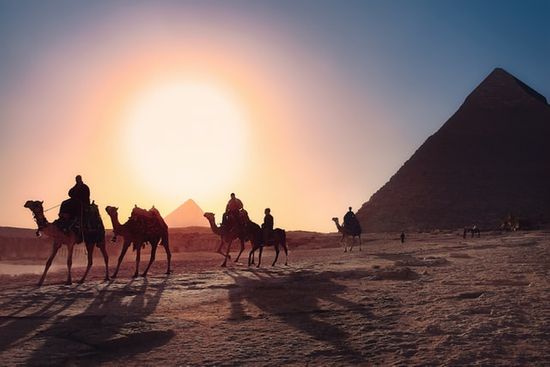Who Were the Israelites in the Bible?
The Israelites in the Bible, also known as the children of Israel or ancient Israel, were a nation God called to represent Him to the world. As recorded in the book of Exodus, He delivered them from slavery in Egypt under Moses’s leadership and brought them to the Promised Land of Canaan (located in a similar area to present-day Israel).
The Scriptures trace their journey through the wilderness and their settling into the Promised Land. It shows their ups and downs—their faithfulness to God and then their rebellion against Him.
This story, though it happened so long ago, connects with our Christian journeys, offering us many lessons and warnings.
So let’s explore more about these people:
- Who were the children of Israel?
- Why are the Israelites important?
- What can we learn from the Israelites?
Who were the children of Israel?
 The children of Israel were a nation of people who came on the scene of the ancient world in the 1400s BC. 1 They were followers of God who descended from a nomadic patriarch named Abraham. In the Bible, Abraham is referred to as a Hebrew, and “Hebrew people” is sometimes used for the whole nation of Israel (Genesis 14:13).
The children of Israel were a nation of people who came on the scene of the ancient world in the 1400s BC. 1 They were followers of God who descended from a nomadic patriarch named Abraham. In the Bible, Abraham is referred to as a Hebrew, and “Hebrew people” is sometimes used for the whole nation of Israel (Genesis 14:13).
God had promised to give Abraham and his wife a son who would grow into a great nation that would bless the world (Genesis 12:2; 17:5). That son was Isaac, who then had a son named Jacob. Jacob’s 12 sons and their families became the 12 tribes of Israel (Genesis 49:1–2, 28).
But you may be wondering why God chose them to begin with. Was He being exclusive?
Why did God have a chosen people?
God chose the Israelites so that He would have a people through whom He could bless the world. He didn’t do it because He wants to bestow privileges on one group of people over another. Instead, He is seeking everyone, and those who respond become His people with a mission.
Here’s a summary of how this plays out:
- God chose Adam and Eve—the first two humans—to reflect Him and rule over the earth (Genesis 1:26–28). But then they doubted His goodness and love and disobeyed Him. Even though God had chosen them, He had to work with their decisions because He created humans with free will.
- Cain, Adam and Eve’s son, rebelled against God, but God still sought after him and asked: “If you do well, will you not be accepted?” (Genesis 4:7, ESV). Cain chose to turn away, and God was not able to use him.
 A couple generations later, “people began to call upon the name of the LORD” (Genesis 4:26, ESV). Some Bible versions translate the verse like this: “People began to call themselves by the name of the LORD.” 2 In other words, they chose to take on the name of God—to be His people.
A couple generations later, “people began to call upon the name of the LORD” (Genesis 4:26, ESV). Some Bible versions translate the verse like this: “People began to call themselves by the name of the LORD.” 2 In other words, they chose to take on the name of God—to be His people.- When the world became almost completely overtaken with evil (Genesis 6:5) God sought out Noah, who responded to Him (Genesis 6:8). As a result, Noah and his family were saved from the Flood.
God has always been in the business of seeking people, but to become His chosen people requires responding to Him.
Then, there was Abraham. God sought him out next.
The call of Abraham
God called Abraham—not because God arbitrarily chooses people, but because Abraham was willing to follow. About 2000 BC, God made a special covenant (agreement) with him (Genesis 12:1–3). The promise included two key elements:
- Land
- Descendants
God was going to bring Abraham to a land where his children would grow into a great nation.
“And I will make of you a great nation…and in you all the families of the earth shall be blessed” (Genesis 12:1–3, ESV).

This covenant was key to God’s plan of restoring the world. Adam and Eve had sinned, alienating themselves from Him and one another. But here, He promises to heal that rift: He will bless the people, and they will be a blessing to others.
What was Abraham’s response to all this?
Obedience, surrender, and worship (Genesis 12:7). He accepted the call.
To learn more about the covenants God made with Abraham, read our article on Abraham.
Isaac, Jacob, and Jacob’s 12 sons
Just as God promised, Abraham and his wife Sarah had a son, whom they named Isaac. He, in turn, had a son named Jacob. Jacob made some serious mistakes in his life, but through an encounter with God, he was renamed to Israel—an overcomer. His 12 sons would form the tribes of the ancient Israelite nation.
As we’ve hinted, Jacob’s story didn’t start too well. He runs ahead of God’s promise and ends up stealing his brother’s birthright through deception (Genesis 27:6–23). As a result, he’s forced to flee for his life (verses 41–45).
Years pass by, but eventually Jacob is placed in a tricky situation.
He gets word that Esau is approaching with an army (Genesis 32:6–7). Will Esau take revenge for the stolen birthright now?
In the past, Jacob always tried to take matters into his own hands. But this time, he had no options. While alone during the night, Jacob was startled by a stranger. Out of fear, he fought back.
Soon, he realized this is not a stranger—he was wrestling with God (Genesis 32:30)! When Jacob finds himself growing weary, God blesses him with the following words:
“Your name shall no longer be called Jacob, but Israel, for you have striven with God and with men, and have prevailed” (verse 28, ESV).
In the Bible, names are often associated with character. Jacob’s name is no different. It meant “supplanter” or “deceiver,” correctly representing how he’d tried to get God’s blessing by deception.
Through struggling with God and being willing to learn and grow, Jacob became an overcomer. His new name Israel represented that change of character.
And this was the name bestowed upon the nation that would come from his 12 sons. God wanted this group of people to be overcomers.
Here’s a chart of the 12 sons of Jacob and the resulting tribes:
| The 12 Sons of Jacob (Genesis 49) | The 12 Tribes (Numbers 1) |
| Reuben | Reuben |
| Simeon | Simeon |
| Judah | Judah |
| Zebulun | Zebulun |
| Issachar | Issachar |
| Dan | Dan |
| Gad | Gad |
| Asher | Asher |
| Naphtali | Naphtali |
| Benjamin | Benjamin |
| Joseph | Ephraim (son of Joseph) |
| Levi | Manasseh (son of Joseph) |
Note: The tribe of Levi is not listed because they did not receive an inheritance of land. Instead, God appointed them to care for the sanctuary and its services (Numbers 1:47–54).
Israel’s growth into a nation
The 12 sons of Jacob (Israel) formed the tribes that would become ancient Israel. For this reason they are sometimes called the “children of Israel.” Because of a famine in the Land of Canaan, these sons went to Egypt for a time. There, they grew from a small group of 70 people to over 600,000 (Exodus 1:5; 12:37).
Someone else noticed this rapid growth and grew concerned:
The Pharaoh of Egypt.
Fearing an uprising, he found a way to enslave the Israelite people (Exodus 1:8–14).

But God had a plan for them. In about 1446 BC, He appointed Moses to lead them out of Egypt through a series of miracles. 3
At last, the Israelites were on their way to regaining the land promised to Abraham’s descendants.
But before that could happen, God needed to renew His covenant with them.
The covenant at Mt. Sinai
God had chosen the children of Israel out of Egypt, and they had responded to the call. He had a special purpose for them, which He confirmed through a covenant:
“Now therefore, if you will indeed obey My voice and keep My covenant, you shall be My treasured possession among all peoples, for all the earth is Mine; and you shall be to Me a kingdom of priests and a holy nation” (Exodus 19:4–6, ESV).
A covenant is a special agreement that God makes with His people. It involves both conditions and promises.
For this covenant, God called the people to gather around Mt. Sinai, where His presence came upon the mountain in billows of smoke, crashes of thunder, and an earthquake (Exodus 19:16–18).

Revealing His holiness and power to the people, He presented them with the covenant. The condition was that the people would live out His laws, which included the Ten Commandments (Exodus 20–23).
In response, the people promised, “All that the LORD has spoken we will do, and we will be obedient” (Exodus 24:7, ESV). The covenant was sealed with the blood of a sacrifice (verse 8).
But they leaned on their own resolve to follow God, and it gave way. Before long, they had broken the covenant.
The rocky history of ancient Israel
The Israelites had agreed to be God’s people. The rest of the Old Testament records how they fulfilled (and at times failed to fulfill) this role.
The book of Joshua describes the Israelites’ conquest of the land of Canaan. But Judges shows their cycle of sin, exile, and victory, which looked something like this:
- The Israelites turned from God
- Enemy nations came and conquered them
- The Israelites cried out to God for help
- God sent them a judge to deliver them
The books of 1 and 2 Samuel, 1 and 2 Kings, and 1 and 2 Chronicles show Israel becoming a monarchy and then dividing into two kingdoms: Israel and Judah. The Israelites who lived in Judah became known as Jews, a term still used today to refer more loosely to all people that have descended from Abraham.
In 722 BC, Israel fell to the Assyrians. Later, the Babylonians besieged Jerusalem, the capital of Judah, and completely conquered it by 586 BC. They took many of the Jews into captivity.
Ezra and Nehemiah tell the story of the return of the Jews to their land and the rebuilding of Jerusalem after the Babylonian exile.
With all these ups and downs in their history, why was God so patient with His people?
They had an important purpose to fulfill.
Why are the Israelites important?
The Israelites were important because of the special covenant relationship they had with God. He wanted them to show His character to the world and prepare people to receive the Messiah, which had been expected since Adam and Eve sinned and God gave them the promise of a deliverer (Genesis 3:15).
Unfortunately, they struggled to fulfill this calling. And God would always honor their freedom to choose.
But they still give us a picture of how God wants to use every single human being.
Let’s explore these concepts in more depth.
God made His covenant with them
As we’ve already noted, God made a special covenant with the children of Israel to remind them of His promise to Abraham. He would make them a great nation and use them to be a blessing (Genesis 12:1–3). By making this agreement, the Israelites also accepted its terms: keeping God’s law.
Having come out of slavery, they were a primitive nation. They had forgotten many of God’s principles of living and needed step-by-step instructions—just like children.
For this reason, God repeated the Ten Commandments. Then, He expanded on them in all the civil and ceremonial laws in the books of Exodus and Leviticus. These laws, which seem excessive to us, were like a teacher to the Israelites (Galatians 3:24).
The people never received salvation by keeping the laws, but the laws and rituals pointed out their need for the coming Savior—Jesus.
The Savior would be a descendant from their nation
 When God promised that all the world would be blessed through Abraham’s offspring, He alluded back to the promise He gave to Adam and Eve (Genesis 3:15)—that an offspring of the woman would conquer the devil. Jesus was that Savior who came through the nation of Israel.
When God promised that all the world would be blessed through Abraham’s offspring, He alluded back to the promise He gave to Adam and Eve (Genesis 3:15)—that an offspring of the woman would conquer the devil. Jesus was that Savior who came through the nation of Israel.
And it was more than mere descent from Abraham’s lineage (Matthew 1:1).
Every aspect of the lives of the Israelites, including the covenant, the laws, and the ceremonies, pointed to Christ and what He would do for the world (Romans 9:4–5).
They were God’s representatives to the world
God called the Israelites to represent His character to the world. They were to be a “kingdom of priests and a holy nation” (Exodus 19:6, ESV).
So why a kingdom of priests?
The priests in Israel served in the sanctuary (temple) that God had instructed Moses and the Israelites to build (Exodus 25:8). There, the priests sacrificed offerings and performed rituals, all of which represented Christ and the sacrifice He would come and make (Hebrews 9:11–14).
As a kingdom of priests, the children of Israel were to show the Savior to the world.

God speaks of this purpose in Isaiah 56:6–7:
“These [the foreigners] I will bring to My holy mountain, and make them joyful in my house of prayer; their burnt offerings and their sacrifices will be accepted on My altar; for My house [temple or sanctuary] shall be called a house of prayer for all peoples” (ESV).
While calling His people to be a kingdom of priests, He also instructed them to be a holy nation.
After all, how could they influence the other nations if they didn’t seem any different? At that time, many of the Canaanite nations surrounding Israel were ungodly—even to the extent of performing child sacrifices (Deuteronomy 12:31).
God wanted the Israelites to represent His character instead of succumbing to these evil influences. They were to show the other nations the beauty of His love.
They are a small picture of all humanity
 The journey of the Israelites gives us a glimpse into human nature and experience.
The journey of the Israelites gives us a glimpse into human nature and experience.
They showed how humans struggle to trust God and allow Him to work. We grit our teeth and try to meet His expectations on our own, forgetting that we can’t overcome sin and evil without His help.
This happened with the children of Israel. The covenant they made with God at Mt. Sinai was faulty—but not because of any fault on His part. Instead, the people agreed to the covenant based on their weak promises. They lost sight of His power that would have helped them to keep the covenant (Hebrews 8:7–9).
The struggle to follow God is characteristic of human experience from their time to ours. So let’s see what lessons we can learn to help us in this struggle.
What can we learn from the children of Israel today?
Because the children of Israel were regular humans like us, we can learn many lessons from them about how to relate to God and His call for our lives. These lessons are:
God calls us to be His special people (1 Peter 2:9). Regardless of our backgrounds, He can take any one of us and make us overcomers, just like He made Jacob into Israel—an overcomer.
God is faithful to His promises (Deuteronomy 7:8). He never fails on His end of the covenant and often even provides for His people when they are struggling and being unfaithful to Him.
Our influence has power. When the Israelite spies went into the land of Canaan and ten of them came back with a negative report, they discouraged the people, leading the whole congregation to disobey God (Numbers 13:31). We have the ability to inspire faith in God, or to plant seeds of defiance or doubt. It’s ultimately our choice, and what we do and how we live makes a difference.
Doubt and distrust can lead to disaster. The Israelites spent 40 years in the wilderness because they distrusted God’s ability to bring them into the Promised Land (Numbers 13–14). Today, we face a similar temptation—will we doubt and distrust God despite all the evidence of His leading?
God works with us to help us grow. Despite all their mistakes and struggles, God didn’t give up on the Israelites. He always provided them with what they needed to learn to rely on Him (Deuteronomy 8:3). Similarly, God sees where we’re at in our walk with Him and provides us with what we need to grow in faith and gain victories.
We’re called to the journey, too
The Israelites have a history of both struggle and victory. Their experience is not that different from ours.
Even as God made His covenant with Abraham, Isaac, Jacob, and then the nation of Israel, He still calls us despite all our shortcomings. All we have to do is respond—just as these people did.

Then, He uses us to point others to Christ and represent Him to the world.
As you read about the children of Israel, find the principles you can take from their experiences. These timeless principles will help you navigate God’s calling on your own journey.
- DeCanio, Frank, “Analysis and Synthesis of Exodus,” Bible.org, March 27, 2012. [↵]
- Henry, Matthew, “Commentary on Genesis 4,” Blue Letter Bible, March 1, 1996. [↵]
- Ibid. [↵]
Questions about Adventists? Ask here!
Find answers to your questions about Seventh-day Adventists
More Answers
Why Many Seventh-day Adventists Choose a Vegetarian Diet
Why Many Seventh-day Adventists Choose a Vegetarian Diet?You may have an Adventist friend who is vegetarian, or maybe you’re attending a Seventh-day Adventist Church for the first time and notice the potluck doesn’t have any meat. This isn’t unusual in Adventism. In...
The Health Benefits of Fresh Air You Should Know About
The Health Benefits of Fresh Air You Should Know About“When you can’t breathe, nothing else matters,” the American Lung Association tells us. And while that’s true, the kind of air you’re breathing will determine the health benefits you experience. Breathing fresh...
What Do Seventh-day Adventists Choose to Eat?
What Do Seventh-day Adventists Choose to Eat?Food blogs overwhelm the internet; food fads are all the rage; and copycat and healthy versions of food are the subject of many a get-together. Eating—and eating the best way—is a big deal. And everybody has a different...
10 Incredible Ways Sunlight Can Improve Your Health
10 Incredible Ways Sunlight Can Improve Your HealthAre you concerned about sunlight’s negative effects? You might be the one who lathers on the sunscreen and covers up when you go outside. Or maybe you avoid being outside as much as possible. You might be surprised,...
Why Is Water So Important?
Why Is Water So Important?We all know that water is a substance we can’t live without. It quenches our thirst and keeps us hydrated on the inside. And it’s necessary for hygiene and cleansing on the outside too. But did you know that the cleansing properties of water...
Ellen White’s Writings and the Adventist Health Message
Seventh-day Adventists are known for their emphasis on healthy living. And Ellen G. White was a significant influence in the development of this priority and practice among Adventists.
Health Clinics
Ellen White and Adventist Healthcare—Ahead of Their Time Medical care in the mid-1800s was primitive, to say the least. Basic concepts we take for granted—such as proper handwashing or recognizing the dangers of bloodletting—were nonexistent. And doctors often had...
What Did Ellen White Teach about Vegetarianism?
What Did Ellen White Teach about Vegetarianism?One thing you might have heard about Seventh-day Adventists is their emphasis on a vegetarian lifestyle. If you’re wondering why that is, it goes back to our church’s humble beginnings: As Adventists studied the Bible,...
How Ellen White’s Teachings Can Improve Your Health
How Ellen White’s Teachings Can Improve Your Health Healthcare in the nineteenth century was said to leave “more disease than it took away” with its use of bloodletting and “medicines” like mercury and arsenic.1 As people questioned these methods, new approaches...
Change Your Perspective on Life with These 5 Mindsets
5 Biblical Mindsets to Change Your Life for the Better Sometimes, life is just plain hard. There’s no way around it. So would thinking about things differently really change anything? Our perspective on life, and everything it throws at us, affects more than we’re...
Bible Promises for When You’re Worried or Fearful
Bible Promises for When You’re Worried or Fearful The Bible is full of beautiful promises that can comfort us in a variety of situations. They can give us hope when we are hopeless, make us feel grateful for God’s love, and comfort us when we’re grieving or suffering....
12 Practical Ways to Overcome Worry
12 Practical Ways to Overcome Worry DISCLAIMER: This content is for informational purposes only. It does not constitute any professional medical advice and is not intended as a substitute for professional mental health therapy. It’s easy to get stuck in a cycle of...
How the Bible Talks About Worry, Fear, and Anxiety
How the Bible Talks About Worry, Fear, and Anxiety Worry and fear are the ingredients of anxiety. It’s easy to see how the world isn’t perfect—and the anticipation of a bad event or experience (that may or may not even happen) can end up draining the peace and...
How to Calm Anxious Thoughts, Using the Bible
How to Calm Anxious Thoughts, Using the Bible You were expecting a phone call from your daughter half an hour ago, and she still hasn’t called. She’s also not answering your calls. You feel your heart thumping as your thoughts race: What if she’s been in a car...
What You Should Know About the Adventist Health Studies
What You Should Know About the Adventist Health StudiesYou may have heard that Seventh-day Adventists care about health. But what you may not know is that Adventists have been the subjects of long-term research into lifestyle and health. Since 1958, researchers from...
Benefits of Sunlight
Yes, There Are Health Benefits of SunlightDespite the bad reputation it’s gotten, sunlight is generally associated with positivity, as shown by songs like “You Are My Sunshine,” or phrases that refer to delightful people as having a “sunny disposition.” There’s a...
Why Your Body Needs Rest for Optimal Health
Why Your Body Needs Rest for Optimal HealthStruggling to think straight? Wondering why you can’t remember that important tidbit you heard earlier today? Feeling like your emotions are about to explode? These are just some of the symptoms that can reveal your need for...
The Seventh-day Adventist Diet: One of Our Key Longevity Secrets
The Seventh-day Adventist Diet: One of Our Key Longevity SecretsOats, avocados, lentils, tofu—probably not what you first think of in a standard American diet. But if you show up at the home of an Adventist, chances are you may be served one of these staples. Out of a...
Why You Need Fresh Air
Why You Need Fresh Air“When you can’t breathe, nothing else matters,” the American Lung Association tells us. We couldn’t agree more! Breathing in clean air is an essential part of caring for our bodies, which God has given us. Together with other health principles,...
Sabbath Meal
Everything You Need to Know About Sabbath MealsFor Seventh-day Adventists, sharing a Sabbath meal with friends and family is one of the most special and memorable parts of the Sabbath. That’s why we want to share with you all about Sabbath meals and why they’re such a...
Adventists and Healthy Living
Adventists and Healthy LivingWhat’s the Adventist “Health Message” All About? One thing Seventh-day Adventists are known for is their emphasis on living healthy lives. Since our bodies are living temples of the Holy Spirit (1 Corinthians 6:19, 20), we strive to stay...
Water’s Importance—Physical Benefits and Spiritual Applications
Water’s Importance—Physical Benefits and Spiritual Applications We all know that water is a substance we can’t live without. Not only does it quench our thirst and keep us hydrated from the inside, but it’s necessary for hygiene and cleansing on the outside as well....
How Important is a “Day of Rest?”
How Important is a “Day of Rest?” Why God Created a Day for Downtime by Martin Casper Do you ever experience the feeling of complete overload? Do you feel like the only way you can get ahead is by slamming it 24/7? I hear these types of comments more and more...
7 Reasons Why a Day of Rest is Important
7 Reasons Why a Day of Rest is ImportantWe live in a fast-paced world. It seems as if success is measured in how much you can do in a short amount of time. (Extra points for the service or product that is available 24/7). The idea that we will be more successful if we...
How do Adventists choose what to eat?
How do Adventists choose what to eat?Every day, parents go through the ritual of getting their kids to eat what is healthy and good while trying to steer them away from what can hinder the growth of their developing bodies. Nutritionists work with their clients to...
How Can I Have a Better Marriage?
Is it possible to have a happy marriage?
Why are many Adventists Vegetarian?
Why are many Adventists Vegetarian?The diet intended for man is outlined in Genesis 1:29, “And God said, ‘See, I have given you every herb that yields seed which is on the face of all the earth, and every tree whose fruit yields seed; to you it shall be for food.’”...
Didn’t find your answer? Ask us!
We understand your concern of having questions but not knowing who to ask—we’ve felt it ourselves. When you’re ready to learn more about Adventists, send us a question! We know a thing or two about Adventists.




















